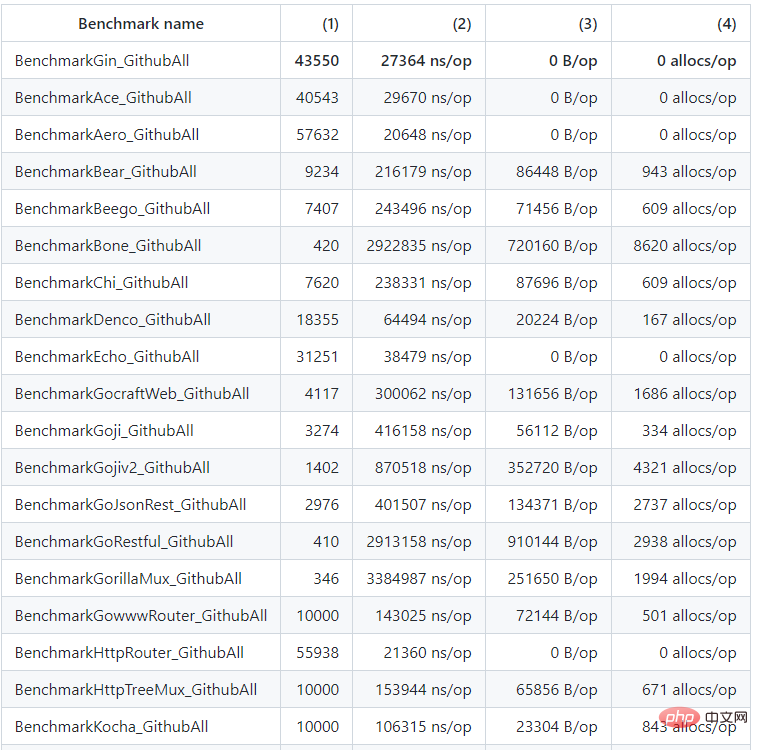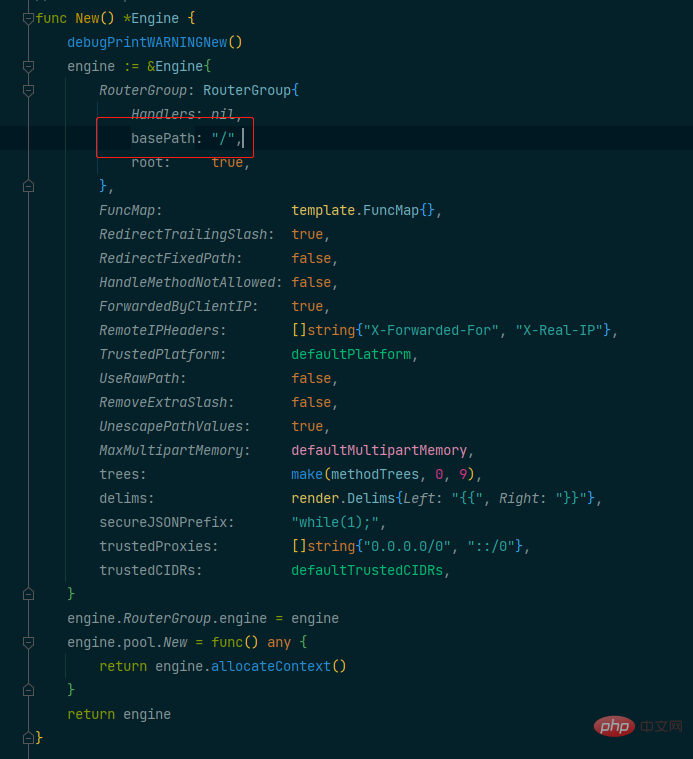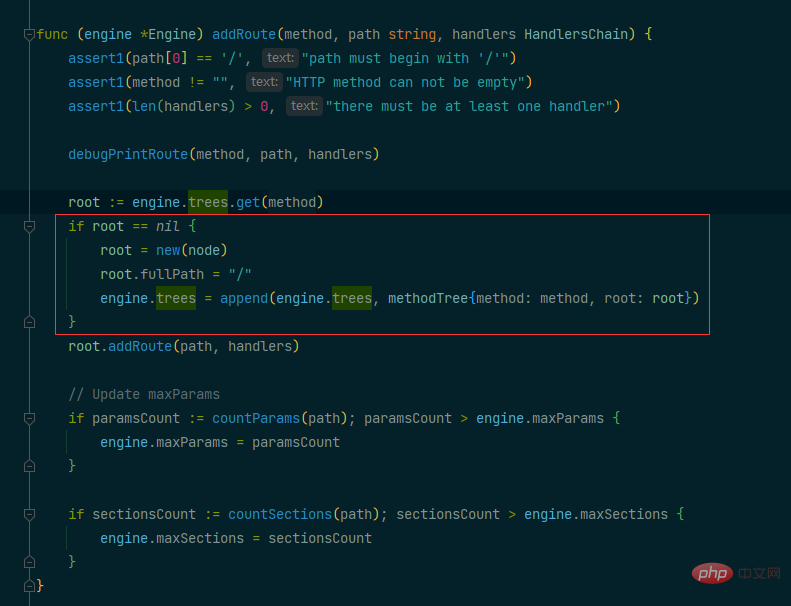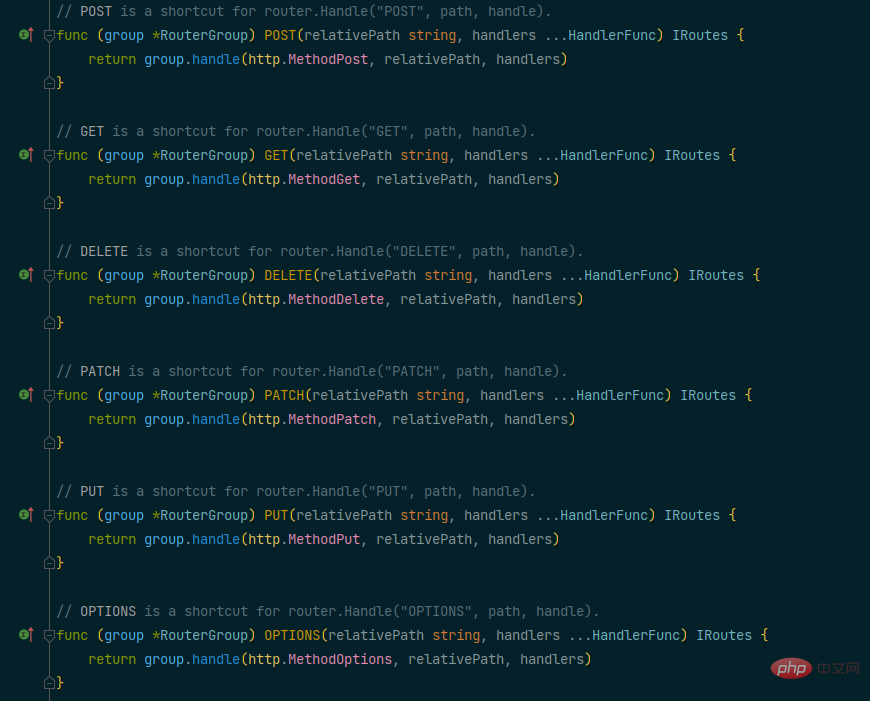Gin은 Go(Golang)로 작성된 HTTP 웹 프레임워크입니다. Martini와 유사한 API를 가지고 있지만 Martini보다 성능이 40배 빠릅니다. 최고의 성능이 필요하다면 Gin을 사용하세요.
먼저 공식 벤치마크 테스트를 살펴보겠습니다. Address[1]

이것은 일부일 뿐이며 위 주소로 이동하면 전체 버전을 볼 수 있습니다.
성능 테스트를 통해 이를 확인할 수 있습니다gin 요청 처리 성능 실제로 다른 것보다 낫습니다(27,31,35,.05);font-family: Operator Mono, Consolas, Monaco, Menlo, monospace;word-break: break-all;">웹 프레임워크가 훨씬 빠릅니다. . gin 在处理请求的性能上确实比其他的web 框架快上不少。
性能问题主要是使用 httprouter[2],而httprouter使用 Trie Tree(字典树)作为路径存储结构,具有高性能的查找。
// Engine is the framework's instance, it contains the muxer, middleware and configuration settings.
// Create an instance of Engine, by using New() or Default()
type Engine struct {
RouterGroup // 用于注册根路由组使用
...
pool sync.Pool // 用于 gin.context 对象池
trees methodTrees // 用于保存的请求路径
...
}在 gin 的Engine
httprouter< /code>사용<code style="font-size: 14px;word-wrap: break-word;padding: 2px 4px;border-radius: 4px;margin: 0 2px;color: #1e6bb8; background-color : rgba( 27,31,35,.05);font-family: Operator Mono, Consolas, Monaco, Menlo, monospace;word-break: break-all;">Trie Tree(사전 트리) 경로 저장 구조, 고성능 조회. 🎜🎜🎜🎜gin.Engine 소스 코드🎜// HandlerFunc defines the handler used by gin middleware as return value.
type HandlerFunc func(*Context)
// HandlersChain defines a HandlerFunc array.
type HandlersChain []HandlerFunc
// RouterGroup is used internally to configure router, a RouterGroup is associated with
// a prefix and an array of handlers (middleware).
type RouterGroup struct {
Handlers HandlersChain
basePath string
engine *Engine
root bool
}엔진 그 중에서 가장 중요한 것은 이 세 가지 분야이다. 🎜// HandlerFunc defines the handler used by gin middleware as return value.
type HandlerFunc func(*Context)
// HandlersChain defines a HandlerFunc array.
type HandlersChain []HandlerFunc
// RouterGroup is used internally to configure router, a RouterGroup is associated with
// a prefix and an array of handlers (middleware).
type RouterGroup struct {
Handlers HandlersChain
basePath string
engine *Engine
root bool
}在RouterGroup中Handlers存放的是当前分组的所有中间件,也可以说:请求到这个分组,那么Handlers 中的函数都会根据索引从小到大的按顺序执行。
basePath 就是存放这个分组的基础路由路径。可能直接解释过于抽象;我们来分析它的调用链来看:



在gin.New() 函数中我们可以看到 basePath 默认是 /
而新的RouterGroup是通过Engine调用Group函数产生的;也就是我们自己的Group。

那么以后在这个Group注册的路径都会自动加上/user的路径。
为什么会自动添加路径,后面还会分析相关细节。
type node struct {
path string
indices string
wildChild bool
nType nodeType
priority uint32
children []*node // child nodes, at most 1 :param style node at the end of the array
handlers HandlersChain
fullPath string
}
type methodTree struct {
method string
root *node
}
type methodTrees []methodTree对于node的添加和查找我就不展开讲了,如果不懂的可以自行搜索字典树和查看 httprouter[3] 的实现。
我们刚刚在gin.New 函数中可以看到,trees是一个methodTree的切片,并在在初始化给了默认容量为9,是容量不是长度哦。

在addRoute 函数中可以看到trees的添加:

처음에 메소드에 해당하는 루트 경로가 없는 경우노드< /code> 객체가 하나 생성되고 해당 경로 등록이 추가됩니다. <code style="font-size: 14px;word-wrap: break-word;padding: 2px 4px;border-radius: 4px;margin: 0 2px;color: #1e6bb8;background-color: rgba(27,31,35,.05);font-family: Operator Mono, Consolas, Monaco, Menlo, monospace;word-break: break-all;">node对象,就会创建一个出来,然后再去添加对应的路由注册。
在gin框架中,主要可以使用下面几种注册方式:
get,post,put...)Group分组路由减少路径的填写Any 注册所有http方法路由这些注册在下面其实都是调用的同一个方法,我们接下来就要来翻开她的外衣看看里面是什么样的。
可以看到都是调用的group.handle
 In
Ingin 프레임워크에서는 주로 다음 등록 방법을 사용할 수 있습니다: get,post,put...)그룹그룹 라우팅으로 경로 채우기 감소모두 모두 등록http메서드 라우팅아래 등록은 실제로 호출된 것과 동일한 메소드입니다. 다음에 하겠습니다. 코트를 열고 무엇이 있는지 살펴보겠습니다. 내부에. 
group.handle 메서드🎜🎜🎜이 메서드의 기능을 살펴보겠습니다.🎜group.calculateAbsolutePath(relativePath)group.calculateAbsolutePath(relativePath)IRoutes接口combineHandlers 支持最大的函数数量为63-1个
现在来看Group的实现,通过调用这个方法会产生一个新的RouterGroup 并根据参数设置的基础路径,和全局engine实体,并把基础的中间件也复制到其中。

使用分组路由最后也是调用group.handle方法进行注册,只是其中的basePath
IRoutes인터페이스 🎜combineHandlers는 최대 63-1개 개별 기능을 지원합니다.  🎜
🎜그룹 구현, 이 메소드를 호출하면 새로운  🎜그룹 라우팅을 사용하는 것도 마지막 호출입니다 < 코드 스타일="글꼴 크기: 14px;워드 랩: 중단 단어; 패딩: 2px 4px; 테두리 반경: 4px; 여백: 0 2px; 색상: #1e6bb8; 배경 색상: rgba(27,31, 35 ,.05);font-family: Operator Mono, Consolas, Monaco, Menlo, monospace;word-break: break-all;">group.handle
🎜그룹 라우팅을 사용하는 것도 마지막 호출입니다 < 코드 스타일="글꼴 크기: 14px;워드 랩: 중단 단어; 패딩: 2px 4px; 테두리 반경: 4px; 여백: 0 2px; 색상: #1e6bb8; 배경 색상: rgba(27,31, 35 ,.05);font-family: Operator Mono, Consolas, Monaco, Menlo, monospace;word-break: break-all;">group.handlebasePath는 그룹화 중에 설정되었으며, 함수 등록 시 경로가 요청 라우팅 경로입니다. 🎜🎜한 가지 주의할 점은 이전에 ·그룹 ·을 사용할 생각을 한 후 후속 등록에서는 반환 값을 사용하지 않았다는 것입니다. 등록된 경로가 글로벌 라우팅 테이블에 등록되는 방식은 소스 코드를 읽고 나서야 이해됩니다. 🎜
添加路由的时候,是获取的全局engine 实体,所以也是添加到全局路由表中的。
在使用注册中间件和注册路由的时候,需要注意他们注册的顺序。
上一点错误的注册方式代码:
package main
import (
"github.com/gin-gonic/gin"
)
func main() {
eng := gin.New()
eng.POST("login", func(context *gin.Context) {
// 处理登录信息
})
eng.Use(gin.Logger())
userGroup := eng.Group("/user")
userGroup.GET("info", func(context *gin.Context) {
// 参数验证
// 处理逻辑
})
adminGroup := eng.Group("/admin")
adminGroup.GET("info", func(context *gin.Context) {
// 参数验证
// 处理逻辑
})
eng.Use(gin.Recovery())
adminGroup.PUT("info", func(context *gin.Context) {
// 参数验证
// 处理逻辑
})
eng.GET("logout", func(context *gin.Context) {
// 处理登录信息
})
eng.Run(":8080")
}运行结果:

可以看到在注册路由之后,再注册中间件,那么前面注册过的路由是没有这个中间件的。
위 내용은 Gin 엔진 소스 코드에 대한 자세한 설명의 상세 내용입니다. 자세한 내용은 PHP 중국어 웹사이트의 기타 관련 기사를 참조하세요!